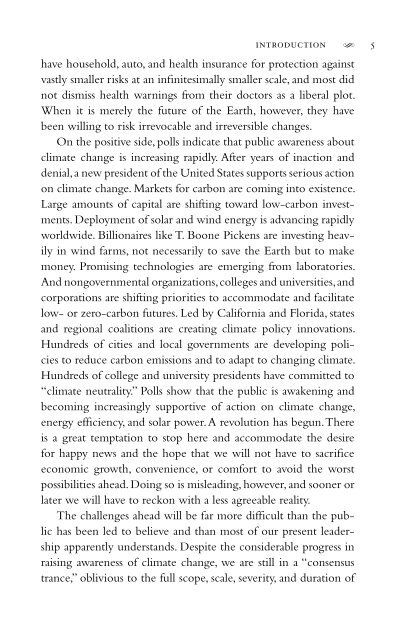Down to the wire : confronting climate collapse / David - Index of
Down to the wire : confronting climate collapse / David - Index of
Down to the wire : confronting climate collapse / David - Index of
You also want an ePaper? Increase the reach of your titles
YUMPU automatically turns print PDFs into web optimized ePapers that Google loves.
introduction S 5<br />
have household, au<strong>to</strong>, and health insurance for protection against<br />
vastly smaller risks at an infi nitesimally smaller scale, and most did<br />
not dismiss health warnings from <strong>the</strong>ir doc<strong>to</strong>rs as a liberal plot.<br />
When it is merely <strong>the</strong> future <strong>of</strong> <strong>the</strong> Earth, however, <strong>the</strong>y have<br />
been willing <strong>to</strong> risk irrevocable and irreversible changes.<br />
On <strong>the</strong> positive side, polls indicate that public awareness about<br />
<strong>climate</strong> change is increasing rapidly. After years <strong>of</strong> inaction and<br />
denial, a new president <strong>of</strong> <strong>the</strong> United States supports serious action<br />
on <strong>climate</strong> change. Markets for carbon are coming in<strong>to</strong> existence.<br />
Large amounts <strong>of</strong> capital are shifting <strong>to</strong>ward low-carbon investments.<br />
Deployment <strong>of</strong> solar and wind energy is advancing rapidly<br />
worldwide. Billionaires like T. Boone Pickens are investing heavily<br />
in wind farms, not necessarily <strong>to</strong> save <strong>the</strong> Earth but <strong>to</strong> make<br />
money. Promising technologies are emerging from labora<strong>to</strong>ries.<br />
And nongovernmental organizations, colleges and universities, and<br />
corporations are shifting priorities <strong>to</strong> accommodate and facilitate<br />
low- or zero-carbon futures. Led by California and Florida, states<br />
and regional coalitions are creating <strong>climate</strong> policy innovations.<br />
Hundreds <strong>of</strong> cities and local governments are developing policies<br />
<strong>to</strong> reduce carbon emissions and <strong>to</strong> adapt <strong>to</strong> changing <strong>climate</strong>.<br />
Hundreds <strong>of</strong> college and university presidents have committed <strong>to</strong><br />
“<strong>climate</strong> neutrality.” Polls show that <strong>the</strong> public is awakening and<br />
becoming increasingly supportive <strong>of</strong> action on <strong>climate</strong> change,<br />
energy effi ciency, and solar power. A revolution has begun. There<br />
is a great temptation <strong>to</strong> s<strong>to</strong>p here and accommodate <strong>the</strong> desire<br />
for happy news and <strong>the</strong> hope that we will not have <strong>to</strong> sacrifi ce<br />
economic growth, convenience, or comfort <strong>to</strong> avoid <strong>the</strong> worst<br />
possibilities ahead. Doing so is misleading, however, and sooner or<br />
later we will have <strong>to</strong> reckon with a less agreeable reality.<br />
The challenges ahead will be far more diffi cult than <strong>the</strong> public<br />
has been led <strong>to</strong> believe and than most <strong>of</strong> our present leadership<br />
apparently understands. Despite <strong>the</strong> considerable progress in<br />
raising awareness <strong>of</strong> <strong>climate</strong> change, we are still in a “consensus<br />
trance,” oblivious <strong>to</strong> <strong>the</strong> full scope, scale, severity, and duration <strong>of</strong>
















